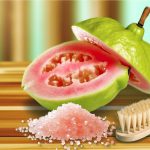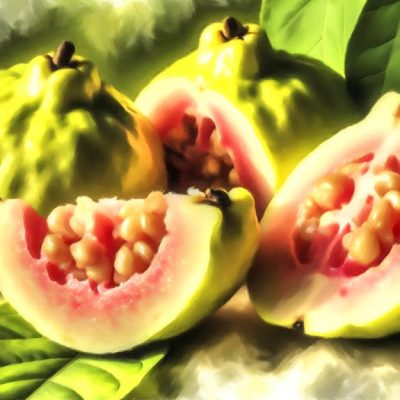Discover the hidden potential of guava bark and roots for medicinal purposes. Guava bark contains anti-inflammatory compounds that help with digestive health by fostering beneficial gut bacteria, leading to enhanced nutrient absorption. On the other hand, guava roots, a key component in traditional medicine, are prized for their antibacterial properties, making them ideal for fighting infections both orally and topically.
Extraction methods such as solvent extraction and steam distillation are crucial for revealing the medicinal benefits of these plant materials. Keep in mind, guava bark and roots should be used cautiously, particularly for individuals with sensitive stomachs or allergies. Approach these natural remedies with caution, and you may reveal a world of health benefits waiting to be uncovered.
Health Benefits of Guava Bark
Guava bark contains compounds that have been scientifically shown to possess various health benefits, making it a valuable natural remedy. One significant benefit of guava bark is its anti-inflammatory properties. Studies have indicated that certain compounds in guava bark can help reduce inflammation in the body, making it a potential treatment for conditions linked to inflammation, such as arthritis.
Furthermore, guava bark offers digestive health benefits. It has been found to aid in digestion by promoting the growth of beneficial gut bacteria and improving overall gut health. This can lead to better absorption of nutrients and a more efficient digestive process. Additionally, the anti-inflammatory properties of guava bark can also contribute to gastrointestinal health by reducing inflammation in the digestive tract.
Traditional Uses of Guava Roots
With a history deeply rooted in traditional medicine, guava roots have been utilized for centuries in various cultures for their medicinal properties and therapeutic effects. The traditional uses of guava roots span across different herbal remedies and ethnobotanical practices. In many indigenous communities, guava roots are brewed into teas or decoctions to treat ailments ranging from diarrhea and dysentery to respiratory conditions like coughs and colds. The roots are believed to possess antibacterial and anti-inflammatory properties that aid in fighting infections and reducing inflammation within the body.
Furthermore, guava roots have been traditionally used as a natural remedy for oral health issues. Chewing on guava roots or using them in mouthwashes is thought to help alleviate toothaches, gum infections, and other dental problems due to their antimicrobial qualities. In some cultures, guava root extracts are also applied topically to wounds and skin infections to promote healing and prevent microbial growth. The diverse traditional uses of guava roots highlight their significance in herbal medicine and ethnobotanical practices.
Extraction Methods for Medicinal Properties
To extract the medicinal properties from guava roots efficiently, various extraction methods utilizing solvents such as water, ethanol, or organic solvents are commonly employed in herbal medicine and pharmaceutical research. Solvent extraction involves using a solvent to dissolve the compounds of interest from the plant material. Steam distillation is a method that uses steam to carry the volatile compounds from the roots. Cold pressing is a mechanical method that applies pressure to extract oils and bioactive compounds. Maceration involves soaking the roots in a solvent to extract the desired components. Each method has its advantages and is selected based on the properties of the compounds being targeted. The table below provides a brief overview of these extraction methods:
| Extraction Method | Description | Example of Use |
|---|---|---|
| Solvent Extraction | Uses solvents to dissolve compounds from the plant material | Extracting essential oils |
| Steam Distillation | Utilizes steam to carry volatile compounds from the roots | Extracting aromatic compounds |
| Cold Pressing | Mechanical method applying pressure to extract oils | Extracting oils from seeds |
| Maceration | Soaking the roots in a solvent to extract desired components | Extracting bioactive compounds |
Potential Side Effects and Precautions
When considering the medicinal use of guava bark and roots, it’s important to be mindful of the potential side effects and necessary precautions associated with their consumption. Guava bark and roots are generally safe when used in moderation, but like any herbal remedy, they may have adverse reactions in some individuals. Possible adverse reactions to guava bark and roots may include gastrointestinal upset, allergic reactions, and interactions with certain medications. It’s vital to consult with a healthcare provider before incorporating guava bark and roots into your wellness routine, especially if you have underlying health conditions or are pregnant or nursing.
To guarantee the safe use of guava bark and roots, several safety measures should be followed. First, always purchase guava bark and roots from reputable sources to ensure quality and purity. Additionally, start with small doses and monitor your body’s response before increasing the amount consumed. If you experience any negative side effects, discontinue use immediately and seek medical advice. Remember, natural remedies can be potent, so it’s important to use them with caution and under the guidance of a healthcare professional.
Incorporating Guava Bark and Roots
For ideal utilization of guava bark and roots in your health regimen, understanding their proper incorporation is essential. Guava bark and roots have been used for centuries in herbal remedies, contributing to holistic healing practices. When incorporating guava bark and roots into your routine, it’s important to view them as part of your natural medicine and alternative therapy arsenal.
To incorporate guava bark and roots effectively, you can prepare them in various forms such as teas, tinctures, or capsules. Brewing guava bark tea by steeping the bark in hot water can help release its beneficial compounds. Tinctures made by soaking the bark or roots in alcohol can also be a potent way to extract their medicinal properties. Alternatively, encapsulating powdered guava bark or root can provide a convenient and concentrated form for consumption.
Future Research and Discoveries
Future research endeavors aim to reveal the untapped potential of guava bark and roots in modern medicine through rigorous scientific exploration and experimentation. Scientists are delving into novel applications of guava bark and roots, exploring their compounds and mechanisms of action to uncover their full therapeutic capabilities. Emerging findings suggest that guava bark and roots may possess antimicrobial properties that could be harnessed to develop new antibiotics to combat drug-resistant bacterial infections.
Additionally, ongoing research is investigating the potential anti-inflammatory effects of guava bark and roots, which could lead to the development of new treatments for inflammatory conditions such as arthritis.
Furthermore, future studies are poised to examine the antioxidant properties of guava bark and roots in more detail, shedding light on their ability to combat oxidative stress and associated diseases. By elucidating the molecular pathways through which guava bark and roots exert their medicinal effects, researchers hope to pave the way for the integration of these natural remedies into mainstream healthcare practices, offering new solutions for various health challenges.
Frequently Asked Questions
Can Guava Bark and Roots Be Used in Combination With Other Herbal Remedies or Medications?
When considering herbal combinations, always consult a healthcare provider to avoid contraindications with medications. Traditional medicine can complement modern treatments if used wisely. Stay informed about potential interactions for safe and effective healing.
Are There Any Specific Guidelines for Dosage and Frequency of Using Guava Bark and Roots for Medicinal Purposes?
When using guava bark and roots for medicinal purposes, remember to adhere to specific dosage recommendations to avoid potential side effects. Benefits include natural healing properties, but drawbacks may arise if consumed excessively, so moderation is key.
Is There a Difference in Efficacy Between Using Fresh Guava Bark and Roots Versus Dried or Powdered Forms?
When comparing fresh vs. dried guava and powdered forms for medicinal use, efficacy may vary due to differences in bioactive compounds and concentration levels. Scientific studies are needed to determine the most effective form.
Are There Any Known Interactions Between Guava Bark and Roots and Certain Medical Conditions or Allergies?
When considering guava bark and roots, be cautious of potential interactions with medical conditions or allergies. Always consult a healthcare provider for guidance on contraindications to guarantee safe usage of these lesser-known medicinal components.
How Sustainable Is the Harvesting and Cultivation of Guava Bark and Roots for Medicinal Purposes?
Sustainably harvesting and cultivating guava bark and roots for medicinal purposes involves strict adherence to ethical sourcing practices. By ensuring sustainability practices are in place, you can contribute to the preservation of these valuable resources for future generations.
Conclusion
To sum up, guava bark and roots possess a myriad of lesser-known medicinal properties that have been utilized for centuries in traditional medicine.
From anti-inflammatory and antimicrobial benefits to potential uses in treating various ailments, these natural remedies offer promising therapeutic potential.
While further research is needed to fully understand their mechanisms of action and potential side effects, incorporating guava bark and roots into healthcare practices may offer novel avenues for exploring alternative medicine and improving health outcomes.











